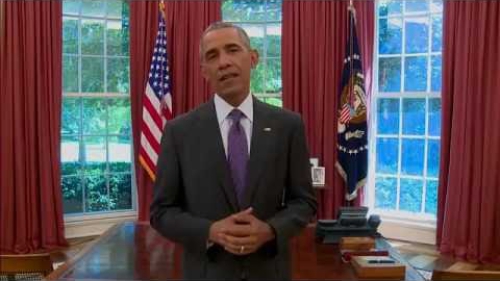Imagine Peace: Semper Fidelis
My favorite peace activist is Muhammad Ali. I didn't feel that way in 1967, when he refused induction into the Armed services, gave up his heavyweight boxing crown and went to jail rather than fight in the Vietnam War. I was 15 years old at the time and admired Ali's guts, but I also figured that fighting in wars, whether you agreed with them or not, was part of the price you had to pay for living in a free country. I suppose that my ideals at that time might have been well expressed by the U.S. Marine Corps motto, Semper Fidelis, always faithful.
Perhaps my views would have been different at the time if I had read, War is a Racket, a 51-page book published in 1935 by retired USMC Major General Smedley Butler (1881-1940). Even more so than Muhammad Ali, Butler could in no way be mistaken for an advocate of nonviolence. Prior to retiring from the Marine Corps in 1931, Butler had faced gunfire 120 times, won the Congressional Medal of Honor twice and become the most decorated U.S. soldier in uniform. Increasingly anti-imperialist views toward the end of his career were probably the only thing that kept him from being promoted to Commandant of the Marine Corps.
In August of 1931, Butler looked back on his military career in a speech that few newspapers dared to report. Butler said he had spent 33 years as a "racketeer for capitalism" and "a high-class muscle man for Big Business, for Wall Street and the bankers." The speech is quoted in a recent book, The Plot to Seize the White House, by Jules Archer.
"I helped make Mexico, especially Tampico, safe for American oil interests in 1914," Butler said in a 1933 speech excerpted on the Internet by the FAS Military Analysis Network. "I helped make Haiti and Cuba a decent place for the National City Bank boys to collect revenues in. I helped in raping of half a dozen Central American republics for the benefits of Wall Street.... I helped purify Nicaragua for the international banking house of Brown Brothers in 1909-1912. I brought light to the Dominican Republic for American sugar interests in 1916. In China, I helped see to it that Standard Oil went its way unmolested.
"Looking back on it, I feel as if I could have given Al Capone a few hints," Butler added. "The best he could do was to operate his racket in three districts. I operated on three continents."
After hearing about Butler from a friend earlier this week, I called my local Barnes and Noble bookstore and learned that I could order Butler's 51-page book, but that it would cost $250. An Internet search of the card catalog in my local public library system found no listings. Those of us who might want to read Butler's words for ourselves, however, are in luck. The Gainesville, FL chapter of Veterans for Peace, republished the short book in 1995 and is selling copies for $5 plus $1 for mailing.
It strikes me as a little bit funny that even though all of the history I was taught in school seemed to be about wars, we never managed to cover a guy as obviously colorful and interesting as Butler. As Archer's book points out, Butler was so colorful and interesting, even a year after his retirement, that a cartel of bankers and corporate interests approached him about overthrowing the newly elected President Franklin D. Roosevelt. The bankers wanted to stop FDR's New Deal, which was intended to help regular people through the Great Depression. Butler blew the whistle on the conspirators. Semper Fidelis.
Last February, in a column entitled, "Once admired now often hated, what happened to America?", Charley Reese of the Orlando, FL Sentinel pointed out that beginning with the Spanish-American War, "America became an empire... Instead of defending people's desire for liberty and independence, we crushed it." Reese cites Butler and continues through an unflattering review of American military campaigns that were and still are instigated by European and U.S. financial interests. He includes U.S. involvement in "Europe's civil wars," by the way. Reese concludes: "We are played for suckers by the people who own our politicians."
So what does this have to do with Muhammad Ali?
The painting, Capture of Fort Riviere, Haiti, 1915, hangs in the Marine Corps Art Collection in Washington, DC, and can be found online, as can all of the above references by searching on "Smedley Butler". The painting depicts Butler winning one of his medals of honor along with two comrades. The three are fighting bravely with their backs to a stone wall in a jungle environment. Their guns are blazing against an unseen enemy: unseen except for the dead body of a shirtless and barefoot black soldier who lies beneath their feet. Is that what happened to the aborted reconstruction that was supposed to follow the abolition of slavery in the U.S.? Is that why Haiti, first in the Americas to throw off slavery, remains among the most destitute of nations?
But I have to put my own personal pain and anger aside, because this is not just a racial issue. The financial interests that have been so instrumental in denying freedom to black people are doing the same thing to people of all races all over the world; even in the very same countries that those financial interests call home. Can the common person afford to be eternally faithful under the weight of such devastating sucker punches? We can't afford not to be. We must remain faithful to our fellow human beings: all of them. The human race can either put aside the ethnic, religious, ideological, territorial and other assorted differences that are so easily used to manipulate us, or we can continue to take second place in a one-sided contest best described by Ali's name for one of his boxing techniques: "rope a dope."
Imagine Peace.
Hassaun Ali Ibn Musa Jones-Bey directs the Imagine Peace Project at http://www.imaginepeace.org.
Copyright 1999 Ibn Musa

















